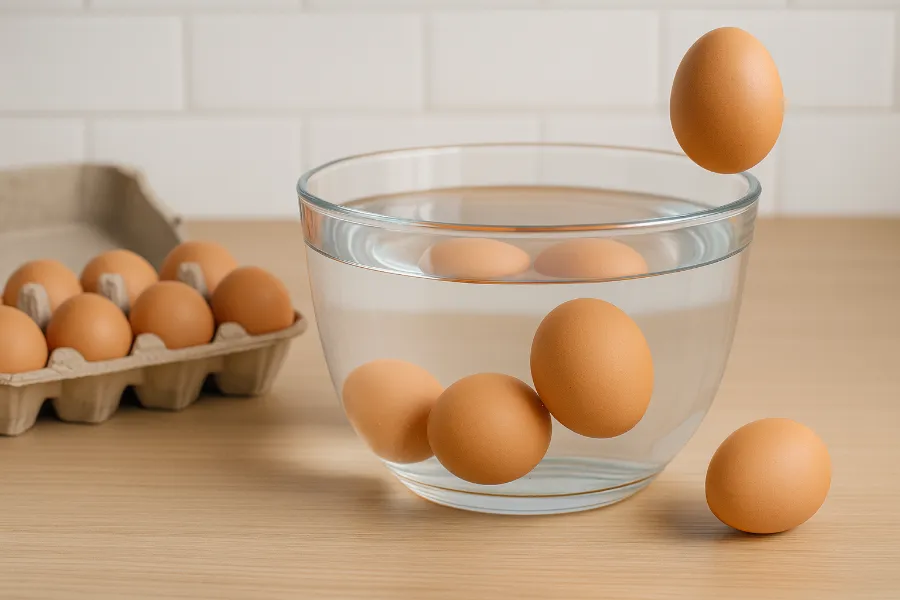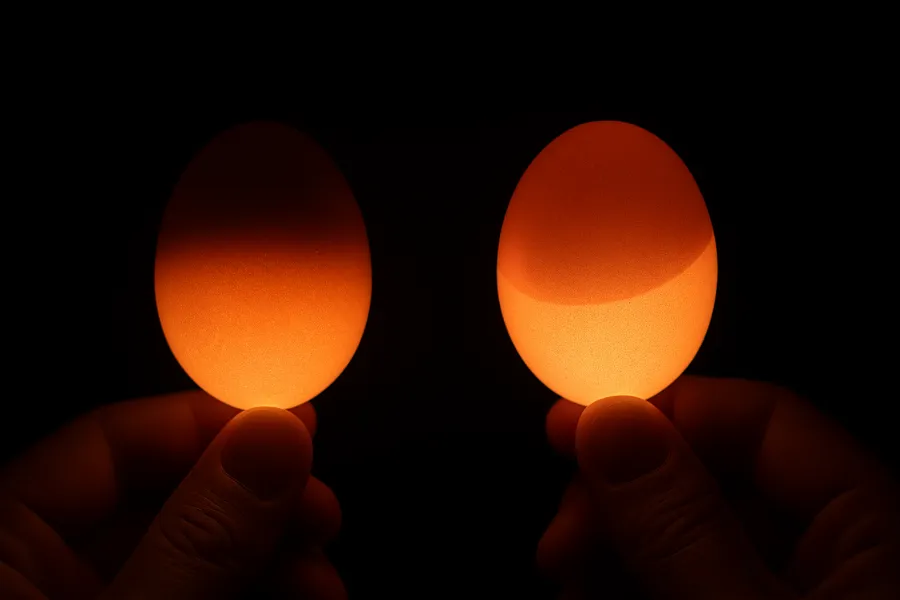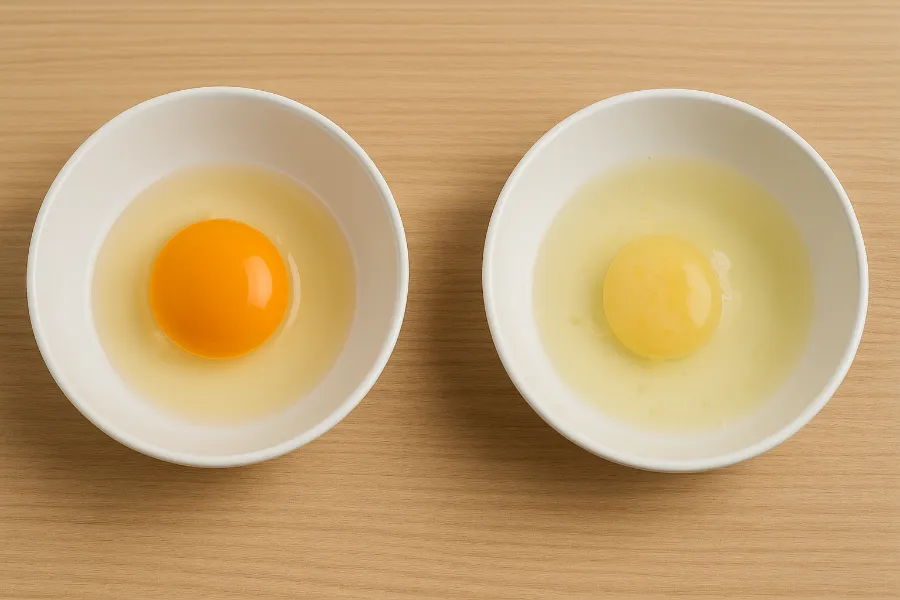If you’re anything like me, you’ve probably found yourself standing in the kitchen, holding a carton of eggs, and wondering: “Are these still good?” That’s where checking egg freshness at home becomes a kitchen lifesaver. Fresh eggs don’t just taste better — they’re safer and can make or break your favorite recipes. Over the years of cooking, baking, and keeping my own backyard hens, I’ve picked up a few tried-and-true ways to know exactly how to tell if eggs are fresh, how long they last, and the best tricks to store them. Today, I’m sharing all of that with you.

How Long Do Eggs Last in the Fridge
Let’s start with one of the most common questions: how long do eggs last in the fridge?
Most store-bought eggs will keep for 3–5 weeks after purchase if they’re stored correctly in the fridge. The key is keeping them at a consistent temperature — ideally 40°F (4°C) or lower. I learned early on not to keep eggs in the fridge door. As convenient as it looks, the door warms up every time it opens, which shortens their shelf life.
If you’re lucky enough to have farm-fresh eggs, how long do unwashed farm eggs last may surprise you. Unwashed ones can actually last longer because their natural protective layer (called the “bloom”) helps keep bacteria out. Once you wash them, though, treat them the same way as store eggs and keep them chilled.
Egg Shelf Life
When we talk about egg shelf life, it’s really about two things: safety and quality.
- Safety: As eggs age, bacteria like Salmonella can become a concern. Refrigeration slows bacterial growth, but it doesn’t stop it completely.
- Quality: Even before they’re unsafe, eggs lose their quality. Yolks flatten, whites become runny, and that “farm fresh” flavor fades.
Here’s a simple way to think of it:
- Fresh eggs: round, firm yolk and thick whites.
- Older but usable: yolk spreads a bit, whites look thin, but still fine for baking.
- Spoiled: strange colors, slimy texture, or a sulfur-like smell. Toss immediately.
If you’ve ever asked yourself, are my eggs still good to eat, these signs will give you a clear answer.
How to Tell If Eggs Are Fresh
Learning how to tell if eggs are fresh isn’t complicated. It’s all about using your senses and a few tricks.
- Look at the carton date. The “sell by” or “best by” date is a good guide, but not the final word.
- Do the sniff test. Fresh eggs smell neutral. If you smell anything sulfur-like or sour, don’t take chances.
- Inspect the shell. Cracks, odd powder, or sliminess mean bacteria may have gotten in.
- Crack it in a bowl. A fresh egg will have a bright yolk that stands tall with whites that don’t spread everywhere.
These steps are quick ways to check how to know if eggs are spoiled before using them in recipes.

Egg Freshness Test
One of the easiest ways to check is the classic egg freshness test float method.
Here’s how you do it:
- Fill a glass or bowl with cold water.
- Gently drop the egg in.
- Watch:
- Lays flat at the bottom: Perfectly fresh.
- Stands upright: Still good, but use soon.
- Floats to the top: It’s bad — toss it.
This works because eggs naturally develop an air pocket as they age. The bigger the pocket, the more likely the egg is no longer safe to eat.
How to Test Eggs for Freshness
The float test isn’t the only way. Here are a few more tricks if you’re wondering how to test eggs for freshness:
- The candle test: Shine a bright light through the egg in a dark room. Fresh eggs have a small air cell, while older ones show a larger air pocket.
- The shake test: Hold the egg close to your ear and give it a gentle shake. A sloshy sound means the insides are breaking down.
- The crack-and-check method: Fresh eggs will have yolks that sit high and whites that are firm.
Are My Eggs Fresh?
Sometimes you just want a simple yes or no. If you’re asking yourself are my eggs fresh, try this quick three-step check:
- Smell it — no odor means you’re good.
- Float test it — sink = safe.
- Crack it in a separate bowl before adding to your dish.
By doing this, I’ve avoided plenty of “oops” moments where a bad egg would’ve ruined my cookie dough or pancake batter.
Egg Storage Tips
Even the freshest eggs won’t last long if you don’t store them properly. Here are my best farm fresh eggs storage tips:
- Keep them in the carton. The carton prevents moisture loss and keeps odors from seeping in.
- Store in the main fridge section. Not the door — the temperature swings too much.
- Pointy side down. It helps the yolk stay centered.
- Don’t wash farm eggs until you’re ready to use them. Washing removes the natural protective layer.
And if you really want eggs to last, you can freeze them. Just crack them into a freezer-safe container, whisk lightly, and store for up to a year. They’re great for baking later. For longer life, how to store eggs properly in fridge makes all the difference.

Why Checking Egg Freshness Matters
It might feel like a small step, but checking freshness really matters. Here’s why:
- Taste: Fresh eggs make fluffier omelets, creamier scrambled eggs, and tastier baked goods.
- Safety: Old eggs can carry harmful bacteria. A quick check helps you avoid foodborne illness.
- Less waste: By knowing when eggs are still good, you won’t toss them too early.
Final Thoughts
Eggs are a kitchen staple, but they don’t last forever. By learning how long do eggs last in the fridge, understanding egg shelf life, and practicing simple tests like the egg freshness test float method, you’ll always know when your eggs are safe and delicious to use.
So, the next time you’re staring at that carton in the fridge, remember checking egg freshness at home is quick, easy, and makes a world of difference.
FAQs
Eggs generally last 3–5 weeks in the fridge when stored at 40°F or below. Farm fresh unwashed eggs can last even longer due to their natural protective coating.
The float test is the simplest: fresh eggs sink, while bad eggs float. It works because older eggs develop larger air pockets inside the shell.
Yes, as long as they pass freshness checks like the float test and smell neutral. The date on the carton is more of a guideline than a strict rule.
Fresh eggs have clean shells, yolks that stand tall, and whites that don’t spread much. Spoiled ones may have cracks, odd residue, or runny contents.
Yes, but they’re older and should be used soon. They’re best for baking or hard-boiling rather than frying or poaching.
Keep eggs in their carton in the main fridge section, not the door. Store them pointed side down and avoid washing farm eggs until just before use.
It ensures better taste, safer meals, and reduces food waste. A quick freshness test keeps you confident in every dish you prepare.













